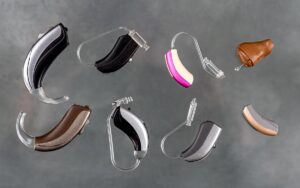Tinnitus is an exceptionally common condition of the ear. It’s one of the most prevalent health conditions in the world with some estimates suggesting that up to 10 percent of the population experiences it at one point or another. The condition is experienced as a sound in the ear that isn’t really there, typically, it’s a buzzing or ringing, but tinnitus can manifest as other sounds too.
Unfortunately, the causes of tinnitus aren’t as obvious as the symptoms. In part, that’s because tinnitus may result from a wide range of causes, some of which are temporary and others that can be more permanent.
That’s why your environment can be critically important. If the background sound of your particular environment is very noisy, you may be damaging your hearing. This environmental tinnitus might sometimes be permanent or it may sometimes react to changes to make your environment quieter.
Why do so many people experience tinnitus?
When you hear noises that aren’t actually there, that’s tinnitus. For most people, tinnitus manifests as a buzzing or ringing, but it may perhaps also present as rumbling, humming, screeching, or other noises as well. Normally, the sounds are consistent or rhythmic. Tinnitus will normally clear itself up after a short period of time. In less common cases, tinnitus could become effectively permanent, a condition known as chronic tinnitus.
Tinnitus is so prevalent for a couple of reasons. The first is that the environmental factors that play a role in tinnitus are also relatively common (more on that in a bit). Root conditions and injuries can bring about tinnitus symptoms and that accounts for the second reason. Put simply, there are many such injuries or conditions that can cause tinnitus. Consequently, tinnitus tends to be quite common.
How can the environment impact tinnitus?
There are a wide variety of factors that can bring about tinnitus symptoms, including ototoxic chemicals and medications. However, when the majority of people discuss “environment” in terms of tinnitus, they actually mean the noise. For example, some neighborhoods are louder than others (traffic noise in some areas can get extremely high). Someone would be at risk of environmental tinnitus, for example, if they worked around loud industrial equipment.
These environmental factors can be incredibly important when considering your hearing health.
Noise related damage, as with hearing loss, can activate tinnitus symptoms. When tinnitus is due to noise damage, it’s normally chronic and often permanent. Here are a few of the most common noise-related causes of tinnitus:
- Music: Many individuals will frequently listen to their music at loud volumes. Tinnitus will frequently be the outcome if you do this regularly.
- Events: Tinnitus can sometimes be caused by loud noises, even if they aren’t experienced over a long time-frame. For instance, attending a concert or using firearms can both lead to tinnitus if the volumes get to a high enough level.
- Noise in the workplace: Many workplaces, including offices, are often the source of loud noises. Tinnitus can eventually result from being in these places for eight hours a day, whether it’s industrial equipment or the din of lots of people talking in an office.
- Traffic: Traffic in densely populated areas can be a lot louder than you may expect it to be. And noise damage can happen at a lower volume than you might expect. Tinnitus and hearing damage can be the outcome of long commutes in these loud locations.
Hearing damage can occur at a far lower volume than people generally expect. For this reason, hearing protection should be utilized at lower volumes than you might expect. Hearing protection can help prevent tinnitus symptoms from developing in the first place.
If I’m experiencing tinnitus, what should I do?
Will tinnitus clear up by itself? Well, in some instances it might. In other cases, your symptoms could be permanent. Initially, it’s basically impossible to know which is which. If you have tinnitus caused by noise damage, even if your tinnitus does clear up, your chance of having your tinnitus return and become chronic is a lot more likely.
One of the most main contributing factors to the development of tinnitus is that individuals tend to underestimate the volume at which damage happens to their ears. Damage has most likely already occurred if you’re experiencing tinnitus. This means that there are several things that you should do to change your environment so as to prevent more permanent damage.
Here are some tips you can try:
- Wearing hearing protection (either earplugs or earmuffs) in order to counter damage. You can also get some degree of protection from noise canceling headphones.
- If possible, try to lower environmental volume. If you have any machinery that isn’t in use, turn it off, and shut the windows if it’s noisy outside, for instance.
- If you’re in a loud environment, regulate the amount of exposure time and give your ears breaks.
How to manage your symptoms
Many people who experience chronic tinnitus find the symptoms to be extremely disruptive and uncomfortable. This prompts them to attempt to find a way to ease the intensity of their symptoms.
If you hear a ringing or buzzing sound, it’s important to schedule an appointment, particularly if the sound won’t go away. We can help you determine the best way to handle your specific situation. For the majority of cases of chronic tinnitus, there’s no cure. Symptom management may include the following:
- White noise devices: Using a white noise device around your house can help you tune out your tinnitus in some instances.
- Retraining therapy: In some cases, you can work with a specialist to retrain your ears, slowly changing the way you process sound.
- Hearing aid: The ringing or buzzing produced by tinnitus can be drowned out by amplifying the volume of external sounds with hearing aids.
- Relaxation techniques: High blood pressure has sometimes been connected to an increase in the severity of tinnitus symptoms. So taking some time to relax (with meditation, for instance) can sometimes help diminish your tinnitus symptoms.
- Masking device: This is a device that fits similarly to a hearing aid and plays sounds to mask your symptoms. Your device will be specifically calibrated to mask your symptoms of tinnitus.
Tinnitus has no cure. That’s why managing your environment to protect your hearing is a practical first step.
But tinnitus can be addressed and treated. We’ll be able to formulate a specific treatment plan based on your hearing, your tinnitus, and your lifestyle. For some, dealing with your tinnitus might simply mean utilizing a white noise machine. In other situations, a more intensive approach might be necessary.
Learn how to best control your tinnitus by making an appointment right away!
[blogcta]





